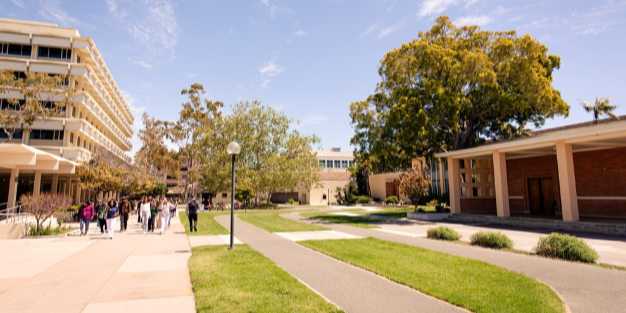ImageFlow/Shutterstock
Alumni are a powerful asset for institutions. Their impact extends beyond the traditional financial support. In our professional roles, we’ve witnessed how engaging alumni strengthens graduate student professional development through graduate schools or academic colleges. Still, we feel more campus units, such as central career offices and alumni associations, can tap into the power of alumni with advanced degrees.
Let’s examine the specific advantages of alumni involvement for graduate students, methods for fostering alumni participation, and long-lasting benefits that come from these partnerships.
How Alumni Can Strengthen Graduate Student Professional Development
There are many benefits of alumni engagement in graduate student professional development. To begin, alumni career outcomes highlight professional paths available for current students in a specific area of study. Since many professional fields have their own competencies, accessing the alumni database provides visible examples to students as they are exploring their next steps.
Furthermore, as students begin to dig deeper into specific career paths or organizations, individual alumni also provide tangible advice to help students understand roles, responsibilities, and transitions with concrete details. This is particularly important for doctoral students who wish to explore diverse career pathways beyond the professoriate. Alumni mentors can fill in the gaps of traditional academic training and more fully prepare students for the professional world.
How To Foster Alumni-Student Relationships
Despite these benefits, many challenges arise when students are told to reach out to alumni for informational interviews: students find it hard to initiate conversations; alumni are too busy to respond to messages; both parties are unclear about expectations.
To address these concerns, institutions are increasingly leveraging networking platforms like PeopleGrove, to create mentoring programs based on showing graduate students how to network, especially for first-generation, underrepresented, and international students. These programs offer a spectrum of mentoring modalities, from micro/flash mentoring to long-term programs. Alumni and graduate students both choose the desired level of engagement and leverage the ease of technology for scheduling, chatting, and institutional support, while focusing on meaningful connections and learning to be better mentors/mentees.
Similar to mentoring programs, engaging alumni also helps unlock the power of experiential learning if a program or opportunity intentionally connects current graduate students to alumni. Some possibilities include job shadowing, company visits, or even micro-internships. These important mechanisms will help students establish a deeper understanding of career fields and professionalism in the workplace beyond having informational interviews, in ways where students get to experience organizational culture, interact with professionals, and observe actions in real time.
Additional Benefits for Individuals and Institutions
Before proceeding, we first want to recognize a common reality of engagement when it comes to alumni with advanced degrees (also called graduate alumni). Historically, universities often engaged primarily with undergraduate alumni. The reasons for this vary, but it often relates to the differences in experience for undergraduate versus graduate students and how that impacts their perceived relationship to the school. But as we previously mentioned, universities are investing more efforts into preparing graduate students to pursue diverse careers, which has resulted in a growing interest in intentional outreach to graduate alumni.
Beyond just career guidance for grad students, there are many other positive outcomes that come from alumni involvement.
Purposeful Contributions and Networking Opportunities for Alumni
Alumni also benefit from engaging with career and professional development for graduate students. The benefits oftentimes vary depending on an individual’s career stage, but the diverse types of engagement all leave a lasting impact on everyone involved.
Recent alumni may still be finding their professional and financial footing post-graduation.
They may not be able or interested in investing money into the institution, but they may be willing to invest their time. Asking them to support professional development initiatives allows them to give back in a non-financial way. In our past work, we both have been blown away by the excitement and willingness of recent alumni to connect with current students. Continued engagement with their alma mater also lets them access networks and networking opportunities, which are growing in importance in today’s job climate.
For mid-to-later career alumni, benefits vary depending on the individual and their role within their organization. For those in the talent space, engaging with their alma mater may also help them tap into talent pipelines that their employers otherwise may be neglecting. Supporting professional development initiatives gives them the chance to participate in mentorship experiences and shape the future workforce.
Fostering Cross Collaboration on Campuses
Engaging with alumni also fosters opportunities for higher ed units and departments to collaborate when they may otherwise have limited interactions on campus. A collaboration between alumni officers and career centers is a natural fit, particularly given all of the benefits we highlighted earlier in the article. For career centers, connecting with alumni may provide a more responsive contact within a company or organization.
Alumni often prove to be an engaged audience and may serve as an internal contact for companies where communications prove challenging. While their role may not be in the talent acquisition space, many alumni are more than willing to make introductions between university units and their points of contact. Moreover, companies often tap alumni to participate in events, such as career fairs, at their alma mater. If working together, career centers and alumni offices can recognize and celebrate such engagement.
When considering graduate alumni, collaborations between alumni offices and graduate schools are crucial. Graduate students often want to speak to alumni who experienced a similar academic path to them. Graduate schools are able to pull from a large pool of experience, while alumni offices can connect with individuals who may not have otherwise been on their radar.
The University of Maryland’s Alumni Association recently worked with the institution’s Graduate School to launch the Doctoral Alumni Mentorship Program, bringing 100 new users onto their Terrapins Connect platform powered by PeopleGrove. Ellie Geraghty, senior director of alumni engagement and outreach for the University of Maryland’s Alumni Association, notes that “Working with the Graduate School has opened exciting new doors for alumni engagement, especially among our doctoral alumni — a group that’s often less visible and traditionally harder to reach.”
She explains that “having strong collaborators like the Graduate School helps us better serve constituents with specialized needs and interests. It’s a small but mighty win — and a great example of how cross-campus partnerships can spark meaningful engagement and career development for our grad student community.” Such an affirmation confirms the benefits of incorporating advanced degree alumni in external engagement efforts.
Conclusion
From career readiness to talent recruitment, alumni engagement plays a key role in workforce development, in partnership with academic institutions. Educators in higher education can also better support the changing needs of today’s students and provide fulfilling engagement opportunities to alumni of all generations. As the job market remains challenging and unstable, we hope this article sheds light on how institutions can better involve alumni in the graduate career development ecosystem.


























